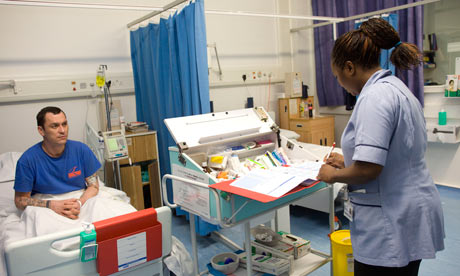
In the rarefied world of NHS finance there are annual debates about the formula for allocating health funding to different areas of the country. But this year, the debate has come out into the open, as finances in the NHS tighten.
Labour's health spokesman, John Healey, has climbed on the back of evidence from the public health unit in Manchester to claim that funding for deprived areas is being cut and re-distributed to richer areas, mostly in the south of England. The Secretary of State, Andrew Lansley, has brushed this off, saying that every area of the country is getting more money this year.
They can't both be right surely? Well actually they can, sort of.
Within the allocation formula, the weighting given to health inequalities - the disability-free life expectancy people can expect to have in a particular area - has been reduced from 15 per cent to 10 per cent. This does mean that, all other things being equal, less money will be sent to Manchester and other deprived areas with worse levels of disability-free life expectancy than would otherwise have been the case. But it is also true that all areas of the country will see funding increases this year.
But there are a number of buts.
First, the Department of Health makes a "pace of change" adjustment so that the reduction in funding based on the change to the formula is implemented gradually over many years. So while Healey is right, sort of, in practice the changes will take many years to work their way through and may never in fact come to full fruition, if this or future governments, or bodies like the NHS Commissioning Board, change the formula again in future.
Second, while Andrew Lansley is right to say that all areas are getting more money this year, including Manchester, most are getting only just enough to cover the costs of inflation. So the NHS needs to work exceptionally hard to keep up with rising demand for services.
Third, ministers are making the argument that "what we are taking away with one hand we are giving back with the other", by transferring responsibility for public health - and the budget that goes with this - to local authorities. This is likely to result in more funding going to areas with higher deprivation and health inequalities, while areas will also benefit from a "health premium" if they are successful in reducing inequalities. But this is only half-convincing since we do not yet know how large this budget will be or how it will be allocated in practice. All that we do know is that it will be dwarfed by the budget for the NHS.
So, where does this get us? Both sides in this debate are right on the numbers, sort of. However, the impact on local budgets is probably less important than the wider message this sends about the government's priorities and how it sees the roles of the NHS and local authorities in the future.
The decision to downgrade the weighting given to health inequalities in the formula does send a worrying signal about the government's view on what the NHS should be focussing on. The Department of Health's own work shows that what will narrow inequalities fastest is good, systematic health prevention work undertaken by the NHS. This must not be forgotten as responsibility for public health is transferred to local authorities - the NHS still has a vital contribution to make to reducing health inequalities in all communities, be they in the north or the south.

